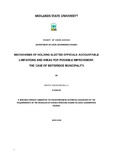Please use this identifier to cite or link to this item:
https://cris.library.msu.ac.zw//handle/11408/3569Full metadata record
| DC Field | Value | Language |
|---|---|---|
| dc.contributor.author | Moyo, Nkosinesisa L. | - |
| dc.date.accessioned | 2019-04-25T13:22:46Z | - |
| dc.date.available | 2019-04-25T13:22:46Z | - |
| dc.date.issued | 2018 | - |
| dc.identifier.uri | http://hdl.handle.net/11408/3569 | - |
| dc.description.abstract | There has been a country wide outcry from citizens about the poor performance of councilors and that they are not doing what the electorate wants them to do. Throughout all the local authorities in Zimbabwe it has been realized that, there is poor oversight, judgment and overwhelming corruption which has in turn led to serious poor service delivery. What is not disputable in Zimbabwean politics is that the ordinary citizens have in most cases been by and large remained political spectators quietly suffering the effects of mishandled democratic principles enshrined in chapter 9 of the 2013 constitution and its ugly consequences on the performance of local authorities. This study therefore assessed the different political accountability tools at the electorate’s disposal in the Municipality of Beitbridge to hold elected councillors accountable for their activities and programs. The study was directed mainly to the councillors and residents to determine the types of accountability mechanisms used in the principal-agent relationship, the degree of familiarity to these tools; elections, social audits, public hearing and participatory budgeting and also the benefits and constraints of their use. The mechanisms/ tools of holding elected officials were chosen from diverse sources of literature. The research followed the guidelines of descriptive research. Data was collected through interviewing purposively and administering questionnaires randomly. The major findings revealed that respondents had limited knowledge about the mechanisms of holding councillors accountable and their extent of use. The researcher therefore recommends citizen participation and access to information be improved to increase the use and effectiveness of the mentioned mechanisms of holding elected officials accountable. | en_US |
| dc.language.iso | en | en_US |
| dc.publisher | Midlands State University | en_US |
| dc.subject | Poor performance | en_US |
| dc.subject | Local authorities | en_US |
| dc.subject | Zimbabwe | en_US |
| dc.title | Mechanisms of holding elected officials accountable limitations and areas for possible improvement: the case of Beitbridge municipality. | en_US |
| item.fulltext | With Fulltext | - |
| item.grantfulltext | open | - |
| item.languageiso639-1 | en | - |
| Appears in Collections: | Bsc Local Governance Studies Honours Degree | |
Files in This Item:
| File | Description | Size | Format | |
|---|---|---|---|---|
| 1_DRAFT_(Autosaved)[1].pdf | Full Text | 1.54 MB | Adobe PDF |  View/Open |
Page view(s)
228
checked on Feb 14, 2026
Download(s)
140
checked on Feb 14, 2026
Google ScholarTM
Check
Items in MSUIR are protected by copyright, with all rights reserved, unless otherwise indicated.



